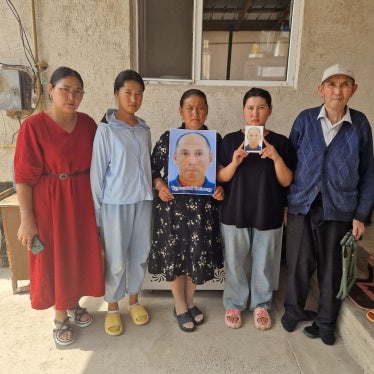Representatives of 70 countries gather in Tokyo Sunday to discuss support for Afghanistan in the years ahead, particularly in the critical years after 2014 when most international troops will have left the country. President Hamid Karzai will say Afghanistan is ready to take charge of its own destiny, but requires long-term help. Donors will pledge partnership and a lot of money. Both Karzai and the donors will talk about the importance of tackling corruption.
None of this will matter unless the Afghan government and donors adopt a people-centered approach to policymaking. This means targeting aid toward basic human needs while providing security to Afghans to go about their daily lives. This also means a renewed commitment to human rights.
A draft of the Tokyo conference declaration reviewed by Human Rights Watch contains commitments by the Afghan government in the areas of elections, anti-corruption and governance -- but none on human rights. This is a shocking omission, since the story of Afghanistan in recent decades has largely been one of human rights abuses, and human rights in Afghanistan are at grave risk.
Of course, the overall human rights situation has improved in Afghanistan since the fall of the Taliban regime in 2001. Maternal and infant mortality have fallen, while the number of children in school has increased. Women have much greater access to employment, freedom of movement and participation in public life. Afghan media have flourished.
But Afghanistan remains near the bottom on most indicators related to human rights. Half of all Afghan girls are not in school and few complete high school. Maternal mortality remains among the highest in the world. Attacks on schools are common. Taliban tactics endanger and at times intentionally target civilians. Women in public life, or simply working outside their homes, face threats and sometimes assassination. Violence against women goes largely unpunished, in spite of a 2009 law meant to curtail it. About 400 women and girls are imprisoned for “moral crimes,” including the mere act of fleeing domestic violence or forced marriage.
Afghan women have fought again and again, with little success, for a place at the table where key decisions about Afghanistan’s future are being made. The NATO Summit in Chicago in May was another example of women being excluded from key discussions. The failure to include women increases fears that women’s rights could be bargained away in a peace deal with the Taliban. Donors need to make a very firm commitment not to support any peace deal in Afghanistan that comes at the cost of women’s rights.
Then there are chronic problems, such as killings, torture, and arbitrary detention by Afghan security forces, with little fear of consequences. An October 2011 United Nations report detailed widespread use of torture in Afghan jails. Officials responsible for torture have been neither prosecuted nor dismissed. The criminal justice system remains dysfunctional.
Instead of ignoring rights, donors should use Tokyo has an opportunity to put maximum pressure on Karzai and his government. While he has made repeated commitments, he has been an inconsistent supporter of human rights. He has ignored abuses, appointed human rights abusers to powerful positions in his government, and bargained away rights for political gain. His support for women in particular is often directly related to the amount of pressure he is under and from whom. When he wants to please the international community, he has taken courageous positions like adopting the Law on Elimination of Violence Against Women. When he needs to placate conservative forces in Afghan society, he takes positions like his endorsement of the Shia Personal Status Law and the Ulema Shura’s March 2012 guidelines for women, which impose Taliban-style restrictions on women's freedom of movement and behavior and condone violence against women under some circumstances.
As the international attention and support for Afghanistan fades, the limited progress achieved on human rights could be lost. Declining aid, increasing insecurity, and poor governance could lead to reversals in key indicators such as school attendance, literacy, life expectancy, and infant and maternal mortality rates. Needed legal and institutional reforms may go unfulfilled.
The donors gathering in Tokyo should tell President Karzai, in no uncertain terms, that international support for Afghanistan is linked to the Afghan government upholding its human rights obligations. At the same time, donors should take a hard look at their own plans and ensure that they are not de-funding services essential for human rights, such as schools, clinics, hospitals, shelters, legal services, and support to Afghan organizations fighting for human rights. Without a stronger focus on human rights, the Tokyo Conference risks being pageant, not progress.
Heather Barr is the Afghanistan researcher at Human Rights Watch







